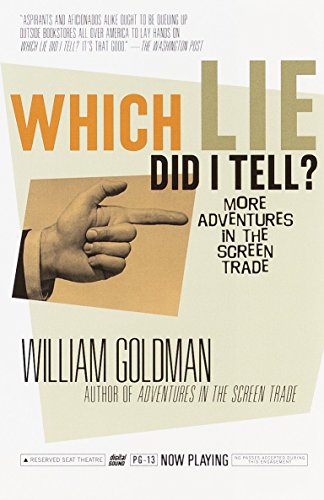I was listening a Bulwark Goes to Hollywood podcast episode in which three movie writers talk about their favorite film books, and I couldn’t help but think of what I’d put on such a list. In the spirit of arranging my interests in parallel, I’ve been reading a lot of books about movies over the last few years, and the one that immediately leaps to mind is Which Lie Did I Tell?: More Adventures in the Screen Trade by William Goldman.
As an example of the book’s insights, here’s Goldman on the two kinds of movies:
There are really two kinds of flicks – what we now call generic Hollywood movies, and what we now call Independent films.
Hollywood films – and this is crucial to screenwriters – all have in common this: they want to tell us truths we already know or a falsehood we want to believe in.
Hollywood films reinforce, reassure.
Independent films, which used to be called “art” films, have a different agenda. They want to tell us things we don’t want to know.
Independent films unsettle.
A little reductive, to be sure, and we could quibble about the details all day if we want, but it’s at least an interesting dichotomy he’s suggesting, and the way he spins it out contains one of the better explanations for why Independent Films tend to do poorly with audiences:
Famous cartoon from fifty years back. A couple are at the original run of Death of a Salesman. The man turns to the woman, here’s what he says: “I’ll get you for this!”
The point is that most of us work all day, often at something we don’t much love anymore but we do it till we drop. At the end of our average days, we want peace, we want relaxation, maybe a bite of food, a few kind words.
We do not want to watch Willy Loman’s suicide.
What we are really dealing with when we talk of the two Hollywoods is audience size.
… Most people want to be told nice things. I cannot repeat that too often to anyone who wants to screenwrite for a living. You can be Bergman if you have the talent, you can tell sad human stories – but do not expect Mr. Time Warner to give you $100 million to make your movie.
Again, plenty to quibble with here. I’d argue that there are lots of crossover flicks, whether it be what Goldman calls a “Hollywood” flick that manages to tell us something we don’t want to know or an “Independent” movie that tells us something we want to believe in, that somehow manage to find a huge audience. Goldman would later touch on this topic again in a famous essay called “Who killed Hollywood?”
I’m not talking here about the difference between entertainment and art. Hollywood films can be, and often are, art. And many, if not most, independent films are boring.
I suspect many would like to upgrade their “quibbles” to something stronger at this point, but I can appreciate this point of view. Goldman’s books are highly recommended and would be number one on my list of great books about movies. I can save the full list for another post, but I should probably get to finishing off the 1978 Project, shouldn’t I?
